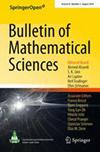具有平凡拟合子群的完全2闭有限群
IF 2.5
2区 数学
Q1 MATHEMATICS
引用次数: 0
摘要
一个有限置换群[公式:见文]被称为[公式:见文]-封闭,如果[公式:见文]是[公式:见文]的最大子群,它使[公式:见文]上的每个[公式:见文]的诱导作用轨道保持不变。1969年由Wielandt引入的闭包概念已经发展成为研究有限集合不变量在集合置换组下的关系的最有用的方法之一;特别是对于图和有向图的自同构群的研究。总的[公式:见文]闭包的概念把人们的注意力从特定的群体行为上转移开,并且是群体固有的属性:一个有限群[公式:见文]被认为是完全的[公式:见文]-闭包,如果[公式:见文]在它的每一个忠实的排列表示中都是[公式:见文]-闭包。有无限多的有限可溶的全闭群(公式见文),它们已被完全地表征,但至今还没有不溶的例子。结果是,让我们有些惊讶的是,确实有[公式:见文]完全[公式:见文]-封闭有限非非贝简单群:Janko群[公式:见文],[公式:见文]和[公式:见文],以及[公式:见文],[公式:见文]和Monster[公式:见文]。此外,如果一个有限完全[公式:见文]-闭群没有非平凡的阿贝尔正规子群,那么我们证明了它是这些简单群的一些(但不是全部)的直接积,并且确实有[公式:见文]的例子。在获得这种分类的过程中,我们开发了一个研究传递置换群闭包的一般框架,我们希望这将证明对研究有限群作为图和有向图的自同构群的表示有用,特别是对攻击长期存在的多循环猜想有用。在这个方向上,我们应用我们的结果,证明了1939年代数图论中Frucht定理的对偶。我们还提出了几个关于置换群闭包的开放性问题。本文章由计算机程序翻译,如有差异,请以英文原文为准。
Totally 2-closed finite groups with trivial Fitting subgroup
A finite permutation group [Formula: see text] is called [Formula: see text]-closed if [Formula: see text] is the largest subgroup of [Formula: see text] which leaves invariant each of the [Formula: see text]-orbits for the induced action on [Formula: see text]. Introduced by Wielandt in 1969, the concept of [Formula: see text]-closure has developed as one of the most useful approaches for studying relations on a finite set invariant under a group of permutations of the set; in particular for studying automorphism groups of graphs and digraphs. The concept of total [Formula: see text]-closure switches attention from a particular group action, and is a property intrinsic to the group: a finite group [Formula: see text] is said to be totally [Formula: see text]-closed if [Formula: see text] is [Formula: see text]-closed in each of its faithful permutation representations. There are infinitely many finite soluble totally [Formula: see text]-closed groups, and these have been completely characterized, but up to now no insoluble examples were known. It turns out, somewhat surprisingly to us, that there are exactly [Formula: see text] totally [Formula: see text]-closed finite nonabelian simple groups: the Janko groups [Formula: see text], [Formula: see text] and [Formula: see text], together with [Formula: see text], [Formula: see text] and the Monster [Formula: see text]. Moreover, if a finite totally [Formula: see text]-closed group has no nontrivial abelian normal subgroup, then we show that it is a direct product of some (but not all) of these simple groups, and there are precisely [Formula: see text] examples. In the course of obtaining this classification, we develop a general framework for studying [Formula: see text]-closures of transitive permutation groups, which we hope will prove useful for investigating representations of finite groups as automorphism groups of graphs and digraphs, and in particular for attacking the long-standing polycirculant conjecture. In this direction, we apply our results, proving a dual to a 1939 theorem of Frucht from Algebraic Graph Theory. We also pose several open questions concerning closures of permutation groups.
求助全文
通过发布文献求助,成功后即可免费获取论文全文。
去求助
来源期刊

Bulletin of Mathematical Sciences
MATHEMATICS-
CiteScore
2.10
自引率
0.00%
发文量
17
审稿时长
13 weeks
期刊介绍:
The Bulletin of Mathematical Sciences, a peer-reviewed, open access journal, will publish original research work of highest quality and of broad interest in all branches of mathematical sciences. The Bulletin will publish well-written expository articles (40-50 pages) of exceptional value giving the latest state of the art on a specific topic, and short articles (up to 15 pages) containing significant results of wider interest. Most of the expository articles will be invited.
The Bulletin of Mathematical Sciences is launched by King Abdulaziz University, Jeddah, Saudi Arabia.
 求助内容:
求助内容: 应助结果提醒方式:
应助结果提醒方式:


